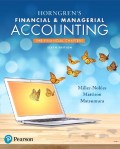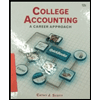
Horngren's Financial & Managerial Accounting The Financial Chapters (6th Edition)
6th Edition
ISBN: 9780134491790
Author: MILLER-NOBLES
Publisher: PEARSON
expand_more
expand_more
format_list_bulleted
Concept explainers
Question
Chapter 7, Problem 17RQ
To determine
Bank reconciliation: Bank statement is prepared by bank. The company maintains its own records from its perspective. This is why the cash balance per bank and cash balance per books seldom agree. Bank reconciliation is the statement prepared by company to remove the differences and disagreement between cash balance per bank and cash balance per books.
Debit and credit rules:
- Debit an increase in asset account, increase in expense account, decrease in liability account, and decrease in stockholders’ equity accounts.
- Credit decrease in asset account, increase in revenue account, increase in liability account, and increase in
stockholders’ equity accounts.
To determine: The reasons to record the journal entries
Expert Solution & Answer
Want to see the full answer?
Check out a sample textbook solution
Students have asked these similar questions
which one is OK ?
Need help with accounting question
Check my work
The finance director for the City of Green Falls printed the General Fund Revenues and Appropriations Ledgers shown below for the
year just ended.
REVENUES LEDGER
Ref.
Account Description
Est. Revenues
Dr(Cr)
Revenues
Balance
Cr(Dr)
Dr(Cr)
Estimated Revenues-Taxes-Real Property
102
Budget Authorization
6,452,400
6,452,400
103
Accrued Revenue
104
Previous Deferral
109
Deferral
6,455,000
345,000
(308,000)
(2,600)
(347,600)
(39,600)
110
Budget Amendment
111
Closing entry
40,000
(6,492,400)
400
(6,492,000)
112
Closing entry
(6,492,000)
Estimated Revenues-Taxes-Sales
102
Budget Authorization.
103
Received in Cash
110
Budget Amendment
111
Closing Entry
112
Closing Entry
736,250
(25,000)
(711,250)
710,600
736,250
25,650
650
(710,600)
(710,600)
e
Q Search
་
PRE
a
1
<
2/
Chapter 7 Solutions
Horngren's Financial & Managerial Accounting The Financial Chapters (6th Edition)
Ch. 7 - Prob. 1QCCh. 7 - Prob. 2QCCh. 7 - Prob. 3QCCh. 7 - Prob. 4QCCh. 7 - Prob. 5QCCh. 7 - Prob. 6QCCh. 7 - Prob. 7QCCh. 7 - Prob. 9QCCh. 7 - Prob. 10QCCh. 7 - Prob. 11QC
Ch. 7 - Prob. 1RQCh. 7 - Prob. 2RQCh. 7 - What are the five components of internal control?...Ch. 7 - Prob. 4RQCh. 7 - What is separation of duties?Ch. 7 - Prob. 6RQCh. 7 - Prob. 7RQCh. 7 - Prob. 8RQCh. 7 - How do businesses control cash receipts by mail?Ch. 7 - Prob. 10RQCh. 7 - Prob. 11RQCh. 7 - Prob. 12RQCh. 7 - Prob. 14RQCh. 7 - Prob. 15RQCh. 7 - Prob. 16RQCh. 7 - Prob. 17RQCh. 7 - Prob. 18RQCh. 7 - Defining internal control Internal controls are...Ch. 7 - Prob. 7.2SECh. 7 - Prob. 7.3SECh. 7 - Prob. 7.4SECh. 7 - Prob. 7.5SECh. 7 - Prob. 7.7SECh. 7 - Prob. 7.8SECh. 7 - Prob. 7.9SECh. 7 - Prob. 7.10SECh. 7 - Prob. 7.11SECh. 7 - Prob. 7.12ECh. 7 - Prob. 7.13ECh. 7 - Prob. 7.14ECh. 7 - Evaluating internal control over cash payments...Ch. 7 - Understanding internal control, components,...Ch. 7 - Prob. 7.17ECh. 7 - Prob. 7.18ECh. 7 - Prob. 7.20ECh. 7 - Prob. 7.21ECh. 7 - Prob. 7.23APCh. 7 - Prob. 7.24APCh. 7 - Prob. 7.25APCh. 7 - Prob. 7.26APCh. 7 - Prob. 7.27APCh. 7 - Prob. 7.28APCh. 7 - Prob. 7.29BPCh. 7 - Prob. 7.30BPCh. 7 - Prob. 7.31BPCh. 7 - Prob. 7.32BPCh. 7 - Prob. 7.33BPCh. 7 - Prob. 7.34BPCh. 7 - Prob. 7.2DCCh. 7 - Levon Helm was a kind of one-man mortgage broker....Ch. 7 - Prob. 7.1CA
Knowledge Booster
Learn more about
Need a deep-dive on the concept behind this application? Look no further. Learn more about this topic, accounting and related others by exploring similar questions and additional content below.Similar questions
- Precision Tools Inc. has the following information related to its direct materials usage: Standard Quantity: 120,000 units Actual Quantity: 140,000 units Standard Price: $2.50 per unit Actual Price: $2.80 per unit A. Calculate the materials price variance and state whether it is favorable or unfavorable. B. Calculate the materials usage variance and state whether it is favorable or unfavorable.arrow_forwardJob Costing: The warehouse supervisor at Alpha Electronics implements a strict cycle counting process where system accuracy must stay above 99%. Daily variances between 1-2% require immediate recount, while those exceeding 2% trigger supervisor review and investigation. During today's audit of electronic components, the system showed 2,400 items, but physical count revealed only 2,356 items present in the warehouse. The supervisor needs to determine the variance percentage before deciding on next steps.??arrow_forwardCan you please provide answer this financial accounting question?arrow_forward
- Get accurate solution this financial accounting questionarrow_forwardCompute the fixed overhead volume variancearrow_forwardDBZ Company produces two products, Gamma and DBZ. Gamma is a high-volume item totaling 25,000 units annually. DBZ is a low-volume item totaling only 8,000 units per year. Gamma requires 1.5 hours of direct labor for completion, while each unit of DBZ requires 3 hours. Therefore, total annual direct labor hours are 55,500 (25,000 × 1.5 + 8,000 × 3). Expected annual manufacturing overhead costs are $720,000. DBZ uses a traditional costing system and assigns overhead based on direct labor hours. Each unit of DBZ would be assigned an overhead of _____. A) $30.00 B) $20.00 C) $32.43 D) $38.91arrow_forward
arrow_back_ios
SEE MORE QUESTIONS
arrow_forward_ios
Recommended textbooks for you
 College Accounting (Book Only): A Career ApproachAccountingISBN:9781337280570Author:Scott, Cathy J.Publisher:South-Western College PubPrinciples of Accounting Volume 1AccountingISBN:9781947172685Author:OpenStaxPublisher:OpenStax College
College Accounting (Book Only): A Career ApproachAccountingISBN:9781337280570Author:Scott, Cathy J.Publisher:South-Western College PubPrinciples of Accounting Volume 1AccountingISBN:9781947172685Author:OpenStaxPublisher:OpenStax College College Accounting, Chapters 1-27AccountingISBN:9781337794756Author:HEINTZ, James A.Publisher:Cengage Learning,
College Accounting, Chapters 1-27AccountingISBN:9781337794756Author:HEINTZ, James A.Publisher:Cengage Learning, College Accounting (Book Only): A Career ApproachAccountingISBN:9781305084087Author:Cathy J. ScottPublisher:Cengage Learning
College Accounting (Book Only): A Career ApproachAccountingISBN:9781305084087Author:Cathy J. ScottPublisher:Cengage Learning

College Accounting (Book Only): A Career Approach
Accounting
ISBN:9781337280570
Author:Scott, Cathy J.
Publisher:South-Western College Pub


Principles of Accounting Volume 1
Accounting
ISBN:9781947172685
Author:OpenStax
Publisher:OpenStax College

College Accounting, Chapters 1-27
Accounting
ISBN:9781337794756
Author:HEINTZ, James A.
Publisher:Cengage Learning,

College Accounting (Book Only): A Career Approach
Accounting
ISBN:9781305084087
Author:Cathy J. Scott
Publisher:Cengage Learning
